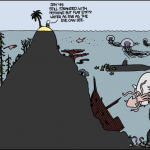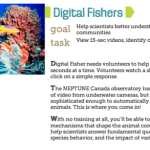In the past, a few readers, interns, random undergraduates, and a curious public have asked all three of us here at DSN “How do you become a deep-sea biologist?” I write this from the perspective of obtaining a Ph.d. in marine biology and I am assuming the reader wants to go for a Ph.d. as well. Some of these are not specific to deep-sea research, but apply generally to any path toward graduate school in the sciences. Below is my take on this, tips and tricks, lessons I’ve learned from doing things both the right and wrong way.
- Love and Pain…Like Sunshine and Rain. Welcome to Deep-Sea Science. Before you start, you better realize what exactly you are heading into. Deep-sea science can be both extremely rewarding and extremely heart breaking. To be a deep-sea scientist is to be one part scientist, one part explorer, and three parts masochist. The logistical difficulties and financial requirements of sampling an environment covered with miles of water will pretty much make every project you want to do either impossible or close to it. While other graduates students and scientists in your department drive a truck down to their field site and take samples till the cows come home, you will be having a nervous breakdown because of insufficient data. A project that takes other scientists a weekend and $250 to do will take you three years and $250,000. So, deep-sea science is not for the faint of heart. However, if you can manage to get a chance (which likely will not happen), then you will probably discover something new, a species, a habitat, a process, or a biological adaptation. Deep-sea science is a young field compared to many other science disciplines. You will never be at a loss for questions, because most of the answers are still unknown. Too bad you won’t be able address all of them. I write this with tongue-in-cheek of course, but I am serious. This is a tough field and doing deep-sea science isn’t easy. Think about this for some time before you move to number 2.
- You Won’t Be Jacques Cousteau. Are you still here? Well, now you better realize a few other things. You are not going to be rich or famous. You will not ride on Zodiacs chasing after charismatic megafauna. You are not likely to spend every day riding around in a sub wearing a red stocking hat. One week per year, one month if you are lucky, you will spend at sea. How that time will fly by! You will spend the rest of the year analyzing that material. You will spend most of the remaining year writing. Writing proposals, grants, papers, emails, etc. I hope you like to write. When you are not writing you will be doing menial and repetitive tasks. Entering numbers into Excel, counting snails, programming, picking absurdly small organisms out of mud, mixing chemicals, these are the tasks that will fill your day. You will also be spending a lot of time on a computer. Not Facebooking, Ichatting, surfing the web for fun, playing the newest game. O’ no my friend, your computer will be the vessel of menial tasks. Thankfully, those menial tasks may actually produce some sort of scientific product (but see Number One).
- Proving Yourself, Again, Again, and Again. From the time you make your first contact with a potential advisor to the time you are full professor, you will have to prove yourself again and again. Publishing papers, obtaining grant money, getting positions, getting tenure, etc will all require an exhaustive and thorough review process of everything you’ve done. If this doesn’t sound like fun then you should reconsider now.
- I Took Underwater Basket Weaving, What Other Classes Will I Need? Before you even think about graduate school you need to think about the classes you had as an undergrad. Hopefully you have had multiple basic biology courses (ecology, physiology, evolution, genetics, microbiology) and paired that with some basic level physics, chemistry, and geology. You don’t necessarily need an undergraduate degree in Marine Biology. My own degree is in basic biology. Invertebrate Zoology will be a must and you better get an A in it (or ichthyology if you prefer the verts). The deep sea and all of its weird creatures will challenge everything you learn. Don’t start off behind. I would require any potential graduate student to have a firm grasp of math and statistics (Calculus 1, Linear Algebra, and Basic Stats at least). Modern science is increasing more quantitative. Now we move to advanced modeling and analytical methods. You can start learning them now or later. Not required, although important, would be a basic logic course. Good science is good logic. Getting the basics can only help. You should also make sure you can write well or at least sufficiently (see Number 2). Some basic understanding of mechanics and engineering would be plus as you deal with temperamental oceanographic equipment.
- Your Training Begins Now and You Are Already Behind. If you have made it to this point, then you are still behind. You will need to start brushing up on everything deep sea. Obviously, DSN is a good first step. Pick a copy of Silent Deep, Deep-Sea Biology, or The Ecology of Hydrothermal Vents. Better yet pick up all three and read them all. When you start emailing people about graduate positions you don’t want to sound like an idiot. Hopefully these books will give you some idea of exactly which subject you would like to research. Yes, you have to be more specific than “deep-sea biology”. If you find all this reading (that in the next step) burdensome or boring then consider another field. You need to be passionate about the subject (see Numbers 1-3) so you should want to do this. In fact, reading about the deep sea should be your idea of great way to spend an evening or weekend. You should feel like this is the greatest thing since sliced white bread. If not, … well, this is not for you.
- Meet Google Scholar, Your Brand New Friend For the Next Several Months Now with all that basic level deep-sea knowledge comes the advanced stuff. Use Google Scholar to search for primary literature on deep-sea topics. You are looking to do a few things. 1) You want to know about all the new advances in deep-sea science (DSN can help you). 2) You want to know who are the movers and shakers in the field, both the legends and the new an upcoming movers and shakers. 3) You are looking for specific topics in deep-sea science that interest you. Some deep-sea publications can be had online without subscriptions or library access. There will be several you cannot get. Don’t fret! Search for the first author’s website to see if they have posted the pdf on their lab’s website. If not, don’t hesitate to email the first author or corresponding author (sometimes different) for a pdf.
- You Can Study Anything You Want, You Just Better Know What It Is. As you begin looking for potential Ph.D. advisors, you will definitely be asked what specifically you want to research. You better have an answer. You will probably want to pick a focal organisms or entire group (mine’s gastropods, KZ’s is anemones and vent critters, Peter’s is coral). The most successful programs come from people having a focal taxon that provides the framework to address larger questions. However, this not the complete story. You need to have a specific question or topic. Don’t worry there is no wrong answer here. Scientists in the field just want to see you have put more thought in this than “deep-sea squid are totally sweet, and I need to work with them.” A good example would be “The factors determining the geographic distributions of species X” or “the evolution of Y’s adaptations to the deep”. After you state the topic you are interested in, be prepared to answer why. Numbers 4 and 5 will help you narrow your ideas and present new ones. Most papers and the books above will leave off with questions that are outstanding in the field.
- Ivy League, Great Surfing, Party School? It Doesn’t Matter! One of the biggest mistakes people usually make when applying for grad school is choosing the institution instead of the person they want to work with. Sure the Ivy League is nice and the name recognition will help a little or living near the beach would be totally sweet, but ultimately they are not that important. Your success will be measured by your own research and the products from that (i.e. publications). Instrumental to this is picking a laboratory and an advisor who will provide both the research topic and the support you need. Start by using your background readings to identify people whose research you find interesting and match your own interests. Pick someone who is currently active in the field and publishing. They will be more likely to have the financial and field support you need. Whatever you do, do not accept a position if you have not met the advisor or, more importantly, their graduate students. Remember you will be spending a lot of time with this person over the next 5-8 years. This is all about “fit” and if you “don’t fit” then things could go horribly wrong. Current graduates students will always be honest about what its like working with Dr. X, and what their department is like. In my own career, I choose not to work with one scientist because their graduate students were generally negative about their time in the lab. Once you pick the advisor, the school will be picked for you.
- Email, Email, and Email some more. Once you find the person (and hopefully, people) you would like to work with (you want options) then you email them. You want to make contact with this person. Express your interest in their research. Ask them questions about their research. Ask for pdf’s of their work. Ask them if they have graduate opportunities in their laboratory. Ask them if you can come and visit. You are interviewing this person as much as they are you, so do not waste the opportunity to gain more information. Don’t worry if they don’t immediately respond, they will be busy or even away at sea. Send a reminder (two max). If they don’t respond to you, or if you get a negative response, this is not bad. In either of these cases you probably don’t want to be that person’s graduate student anyway.
- The GRE, Why It Hates You, and All The Other Stuff You Need To Get Into Graduate School. The GRE is a SOB but a necessarily evil. Take it and score high, no problem. Score low, things are not over but more become difficult. In my experience, the GRE measures less what you know but rather how well you can take a test. Although expensive, it would be well worth the money to take a GRE course. Now in actuality the GRE is just single metric in which your application is viewed. A high GPA, research experience, and a well-articulated essay go much further and can outweigh any GRE score (as long as you are above a minimum standard, but even that can be flexible). If you are still an undergraduate (or even not) get some (any) research experience. It shows dedication to and a familiarity with working in a laboratory or doing research. Those experiences can also lead to strong letters of recommendation, which you will also need. You don’t want your only letters coming from a course instructor with whom you took one class. Now, here is the part that no one ever mentions. Having a strong faculty advocate for your admission is essential. This is why Number 9 is so important. Typically, all the graduate applicants files are passed around the department and faculty are asked to make their picks. If a faculty member wants you they will serve as an informal advocate in your behalf. “I know so-so’s GRE’s are low, but I have had great interactions with this person, they visited the lab, they have X,Y,Z, and ultimately I think they will be a great fit.”
- You Better Make Sure You Really Love This. See Number 1






Great post Craig!
You’ve made me feel much better about not having become a deep-sea biologist (a more than occasional dream).
But you’ve also made me hold a much higher respect for you guys in the field. I mean, few of your problems are exclusive to deep-sea biology (they pretty much all apply to every field of biology in some lesser form or another), but your challenges seem vastly multiplied by the number of gallons in the deep.
Kudos to you guys for having the passion to stick through it all and show the rest of the world what we would likely never see or know otherwise! Rest assured that it is appreciated.
You’re the Milton Love of the deep! Um, also, some of us kinda may have gotten B’s in invertebrate zoology and gone on to be invert fiends. Learn HOW to study! The pure love isn’t always enough!
Terrific post – love that you begin by paraphrasing Rob Base & DJ Easy Rock.
CK,
I think both of us just dated ourselves. Not to mention exhibited our fantastic taste in music
To do deep sea research, it also helps to be white, male and hetero.
I was once in that field but grew weary of the homophobic attitudes. And after a prominent researcher told me that people like me don’t belong in science, I stopped fighting and switched to a field less insular and bigoted.
That’s unfortunate, and cruel. I don’t agree with the generalization, though. There are many well respected female scientists in deep-sea biology and related sciences. Several hold leadership positions at prominent research institutes. It’s true there are too few people of color, but doesn’t this hold for science in general?
Interesting How You Guys Over There Capitalize Every Word Of Any Given Title. I’ve Noticed This In Many Papers Over The Years. What Gives?
Dr. Glitterbear,
You situation is very unfortunate! We need more diversity in deep sea, and marine science in particular. I agree with Peter that women in marine science and deep sea science are becoming more and more commonplace, which is terrific! My boss is one of the few groundbreaking women in deep sea biology and has been working in this subject since the late 70s/early 80s at a time when it was probably harder to break in to the white, male, hetero system.
As far as diversity in gender identity/sexual orientation we have a LONG ways to go! There are some fantastic outspoken LGBT marine scientists out there though. In this era, I think it would be easier to break in. But I’m not in your boat and don’t know how recent you were working in the field. I hope you can get back into marine research one day though. Its a shame to lose talent due to bigotry. I’ve also found from personal experience that some advisors and bosses will try to break you any way they can. I don’t know why, maybe they think they are weeding out the weak, toughening you up, who knows. But sometimes switching labs is one the best things you can do for yourself! A change atmosphere really worked wonders for me.
Peter & Kevin,
The presence of successful female deep sea biologist does not negate the fact that being female or a person of color or a sexual minority makes life in science (and the world in general) more difficult and there are far more road blocks to success. I am sure if you canvass this successful women, most of them have had to deal with some form of sexism in science although this is obviously not special to deep sea biology.
My experience as a grad student in the early to mid 90’s in this field was not healthy or supportive from professors to students to support staff and ship crew. Maybe, my experience is a complete random occurrence and every one else like me has had a lovely experience.
After that first failed attempt at a marine biology education, I left science for a spell but returned to complete an MS in marine biology and a PhD in biology but focusing on marine invertebrates. I have been at three marine labs across the country and at each one I have had to deal with some form of bigotry and discrimination ranging from property vandalism to comments and slurs. Since leaving to study a completely different field of science, I have had much success and no one refers to me as ‘the faggot’ or vandalizes my car or told me I don’t belong. It has been rather refreshing.
I really appreciate the candidness of your article. Some of my students have expressed a desire to go into this field, but I believe they just see the glamour of being on a ship sailing around making discoveries. It is this type of article marine biologist wanna-bes need to read and probably won’t find in their after high school research or from a guidance counselor. Thank you.
Since I was very young, I have dreamed of becoming a marine biologist. I then figured out i wanted to be a deep sea marine biologist. This article really helped me a lot, and I am happy to report that I am STILL interested in this field. Keep up the good work and please try to inspire others!
Hi Dr. M,
As a young, attractive white male with no mustache, how do I break into this mustache dominated field?
Sincerely,
Mustacheless in Missouri
Really great article! I wish I read something like this when I was starting off. One thing that I would add is the importance of interning/volunteering as soon as possible in college or before hand. I’ve been trying to make a career in marine biology with just a BS and I only did a little volunteering and interning in my last year and just after and it has been rough trying to get jobs. I haven’t even worked a proper marine bio job, trying though.
As an undergrad in my 3rd year of aquatic and terrestrial ecology (still 4th year to go), I really appreciate the advice in this article. So much so that I’ve bookmarked it and plan to follow it as such. I still intend to get into the field of deep sea, and reading those books mentioned does seems like a good time to me, nerd that I am.
Im only 12 but it has always been a dram of mine to do this. its never to late to start studing right?
HI! I work in a medical microbiology laboratory in South Africa, and I am interested in doing research e.g. ships going to Antarctica etc. How do I get hold of anyone?
e-mail s.geld(at)hotmail.com I will email my cv and qualifications :)
!Thanks!
I seem to be a little younger then youger than you guys but has a big dream I been wanting to get a job for deep-sea biologist for ever… and this made me belive even more and to try harder. I’ve been studing dseep-sea since I was in 5th grade and loved it since and let me just tell yoouthat i am no longer in school but in hope this helps
Hello, I’m a junior in highschool and loves marine biology. Deep sea science has intrested me for years because of Monteray bay aquarium. Are the criteria listed here on the list changed over the last 3 years?
Justin,
Still the same.
hi………. MY SELF SAMPATH, I AM COMPLEATED POSTGRADUATION IN MICROBIOLOGY.
DrM I WOULD LIKE THE PAGE, I WOULD LIKE TO BECOME A Deep-Sea Biologist CAN U HELP
Greetings from Ecuador!
Hello my name is Winer and I recently started reading DSN. I really appreciate this post it is really helpful. I am, and after reading this post STILL interested in deep- sea biology. I got my major on Biology last year and now I started to looking foward to my graduate studies, I am interested mainly in evolutionary biology but also on molecular biology. I really find amazing how the species of the deep sea adapts to this extreme enviroments.
For now I am looking for a masters program where I can gain more experience in research and give me the skills to do a PhD, hopefully, related to deep sea biology. Unfortunately in my country there is not a program related to the topic where I can gain experience, yet and I would like to know more about the research that has been done by my country. I wondered where it would be more advisable to start, you know someone who is currently working near Ecuador, related to deep sea topics?
I really love the blog, keep up the good work and thank you very much!
Just stumbled across this post, so I’m coming in a few years late on this one. One more piece of advice though: don’t hinge your career on deep-sea biology alone. MOST successful deep-sea biologists have questions that translate across systems. And, with the exception of a few R1 or private institutions, you will almost never see a University or College wanting to hire a deep-sea biologist. Most Universities and especially small colleges want someone who will work locally with students. I’m not saying you can’t be a deep-sea biologist at almost any University or College, but you better be ready to sell them on the fact that you are something else (an evolutionary biologist, a community ecologist, a biogeochemist, etc), too.